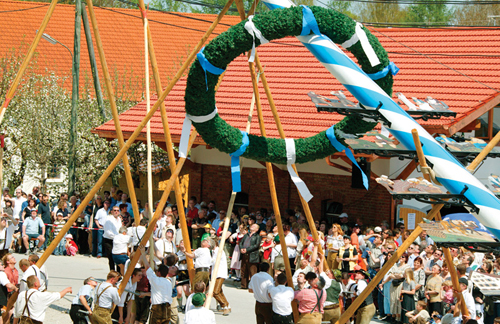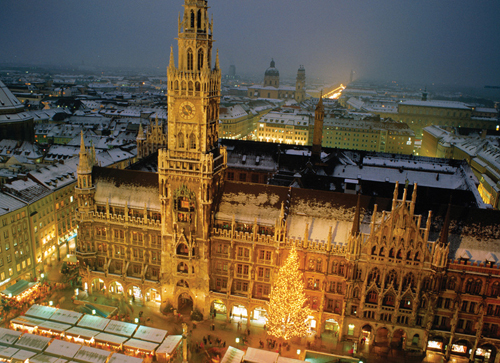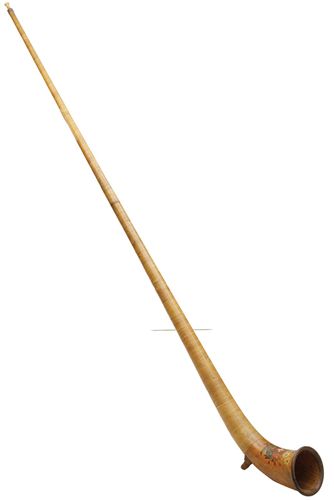|
On Shrove Tuesday, ski
carnival is celebrated in the Alps. The best known is held at Firstalm –
there’s a prize for the best costume.
|
|
|
Curling and a trial of strength called Fingerhakeln (finger wrestling) are traditional Bavarian sports.
|
|
Schäfflertanz Every
seven years, the Dance of the Coopers is performed to commemorate the
end of the plague in the 1400s. The next one will take place in 2012. Dance of the Market Wives Viktualienmarkt market women perform a dance in fancy dress. Starkbier Season Since
“liquids don’t count during fast-time,” monks brewed a nourishing ale
during the lenten fast, a tradition that has survived to this day.
Bavaria’s “fifth season” is launched by the ceremonial breaching of bock
beer barrels, the most famous being the Salvator breaching on Nockherberg. Maypole Most
Bavarian towns and communities raise decorated Maypoles on 1 May, a
custom dating back to the Middle Ages when the “tree of life” was
thought to bring success. Overnight, the Maypole is guarded by local
youths: If a Maypole is stolen, it has to be ransomed with many barrels
of beer.

Raising of the Maypole
Corpus Christi Procession Corpus
Christi processions are held throughout southern Bavaria – the largest
is in Munich – to mark this important Catholic feast day. Kocherl Ball Annual
“Cook’s Ball,” where costumed couples dance a Bavarian waltz and polka
at 6am at the foot of the Chinese Tower in the Englischer Garten. This
tradition harks back to an annual ball for Munich’s domestic servants. Leonhardi Processions Bad
Tölz, Schliersee, Murnau, and many Bavarian towns stage processions on
horseback or in painted carts in honour of St Leonard, the patron saint
of horses. Christkindlmarkt Wonderful Christmas markets with stalls, mulled wine, and treats. On Marienplatz and in many other areas of the city.

Alphorn, Yodeling & Schuhplattler The
Alphorn was a means of communication between cow-herders across long
distances, as was yodelling, which evolved into a style of singing.
Young men danced the Schuhplattler – a folk dance involving much
slapping of shoe soles. These traditions are a mainstay at regional folk
festivals.

Folk Dress Each
region has its own distinctive folk dress, and folklore associations
keep the tradition alive, parading regional costumes in processions and
at festivals such as the Wiesn.
Top 10 Holidays & Celebrations
New Year’s Eve Best places to enjoy the spectacular fireworks: Bavaria statue, Olympiaberg, high-rises, and the highest banks of the Isar. Epiphany During the week before 6 Jan, children dress up as the Three Magi and go door to door, collecting money for charity. Ash Wednesday Carnival (Fasching) is followed by a fasting period and the start of the bock beer season. Easter Easter egg hunts in Tierpark Hellabrunn and other locations. Labour Day The raising of the Maypole and union marches are on 1 May. Corpus Christi One of the most important days in the Bavarian Catholic calendar. Munich has a large procession. Thanksgiving Thanksgiving and Kirchweih (consecration of churches) fall on the same day. The Auer Herbstdult often begins on Thanksgiving, as does the Almabtrieb, when the cattle are driven from Alpine summer pastures. All Saints’ Day On 1 Nov, graves are decorated and lanterns lit. Halloween is celebrated the night before. St Martin’s Day Children carry lanterns in processions led by a rider dressed as St Martin. Roast goose is traditional at dinner. Christmas Christkindl markets start on the first day of Advent. Midnight mass is held 24 Dec.
|